Impaired Driving & Other Traffic Safety Topics
National Traffic Law Center
 Welcome to NTLC's resource center for impaired driving and traffic safety topics. Listed here are some of the extensive resources including expert insights, research, and practical tools designed to support prosecutors, law enforcement, and safety professionals in addressing impaired driving and promoting safer roadways. Below is a sample of the resources offered. For specific questions, please submit a request for additional assistance here; one of the NTLC subject matter experts will respond quickly with additional information.
Welcome to NTLC's resource center for impaired driving and traffic safety topics. Listed here are some of the extensive resources including expert insights, research, and practical tools designed to support prosecutors, law enforcement, and safety professionals in addressing impaired driving and promoting safer roadways. Below is a sample of the resources offered. For specific questions, please submit a request for additional assistance here; one of the NTLC subject matter experts will respond quickly with additional information.
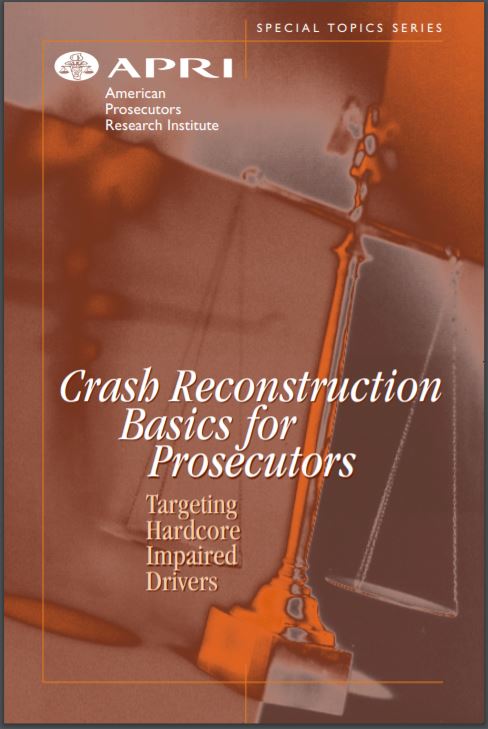 The Crash Reconstruction Basics for Prosecutors guide provides a foundational overview of crash investigation techniques, emphasizing how prosecutors can assess and strengthen cases involving impaired drivers. It covers methods for determining vehicle speed, point of impact, and operator identification using physics-based analyses like energy and momentum calculations, tire mark interpretation, and event data recorder (EDR) data. The publication also offers strategies for challenging defense experts and preparing for trial in vehicular homicide and serious crash cases. NOTE: This resource is currently being updated and will be published soon. Please check back regularly for the latest version and new content.
The Crash Reconstruction Basics for Prosecutors guide provides a foundational overview of crash investigation techniques, emphasizing how prosecutors can assess and strengthen cases involving impaired drivers. It covers methods for determining vehicle speed, point of impact, and operator identification using physics-based analyses like energy and momentum calculations, tire mark interpretation, and event data recorder (EDR) data. The publication also offers strategies for challenging defense experts and preparing for trial in vehicular homicide and serious crash cases. NOTE: This resource is currently being updated and will be published soon. Please check back regularly for the latest version and new content.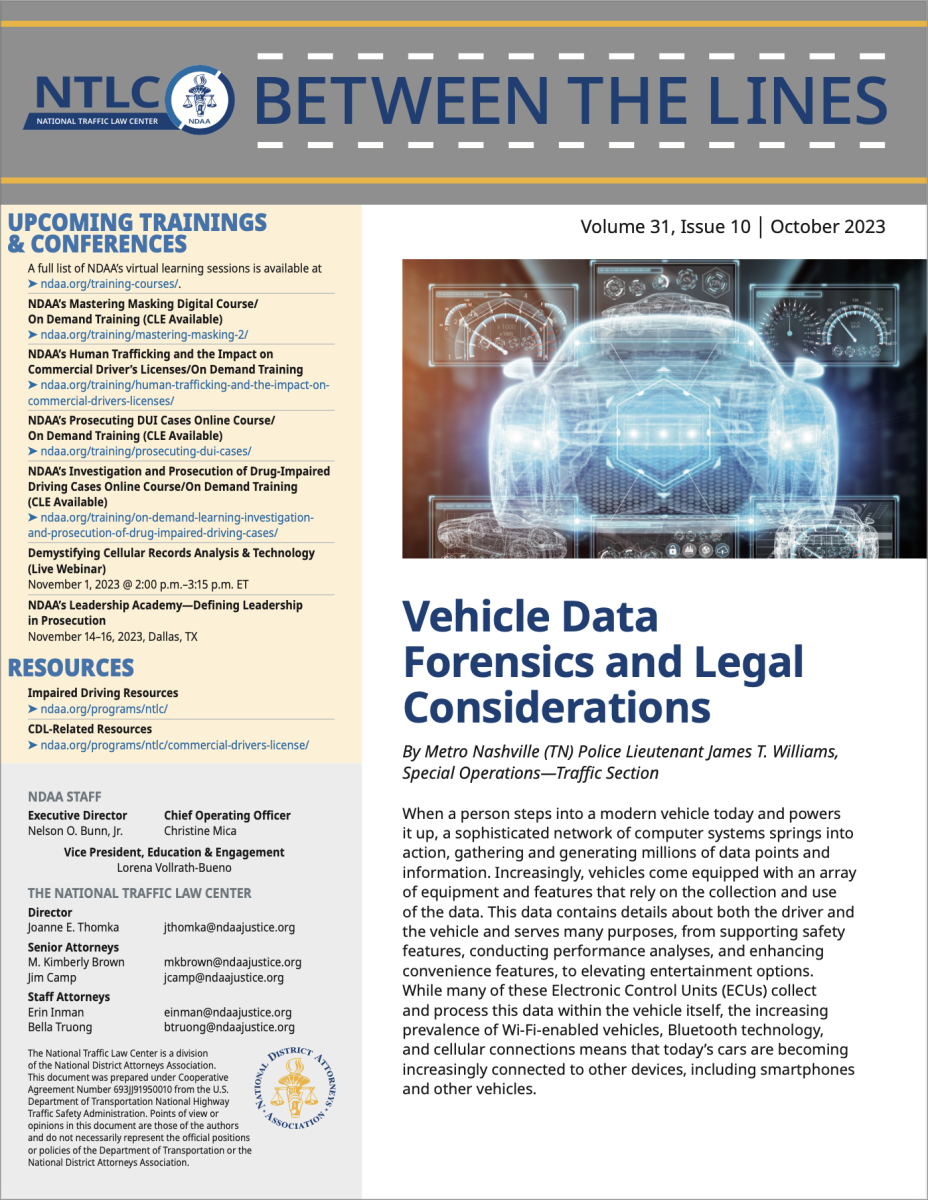 Lt. James T. Williams explores the growing role of vehicle data forensics in modern investigations, highlighting how electronic control units (ECUs), event data recorders (EDRs), infotainment systems, and telematics can provide critical evidence in cases like vehicular homicide. It emphasizes the importance of proper forensic techniques, legal considerations such as search warrants and privacy laws, and the need for trained experts to ensure data integrity and admissibility in court. A case study illustrates how combining vehicle data with traditional investigative methods can significantly strengthen a prosecution.
Lt. James T. Williams explores the growing role of vehicle data forensics in modern investigations, highlighting how electronic control units (ECUs), event data recorders (EDRs), infotainment systems, and telematics can provide critical evidence in cases like vehicular homicide. It emphasizes the importance of proper forensic techniques, legal considerations such as search warrants and privacy laws, and the need for trained experts to ensure data integrity and admissibility in court. A case study illustrates how combining vehicle data with traditional investigative methods can significantly strengthen a prosecution.- Autonomous Vehicles
- Driver's Licenses
- Drowsy Driving
- License Plate Readers
- Speeding, Aggressive, Reckless, and other Risky Driving Behaviors
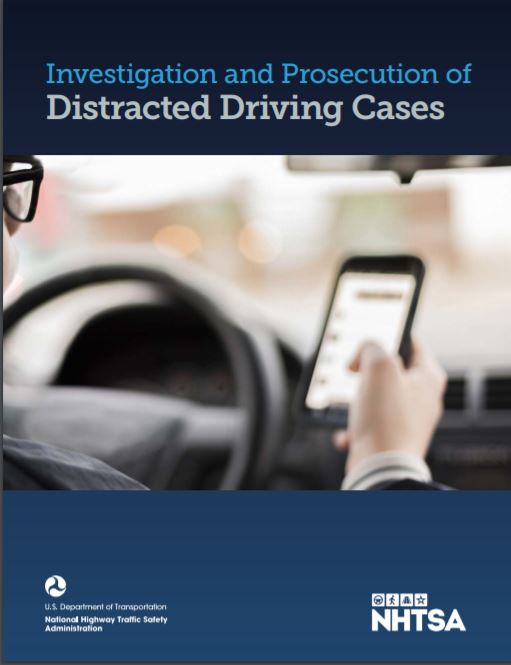 The Investigation and Prosecution of Distracted Driving Cases guide outlines the dangers of distracted driving, emphasizing its role in thousands of injuries and fatalities annually. It categorizes distractions into visual, manual, cognitive, and combination types, and provides strategies for law enforcement and prosecutors to detect, investigate, and prosecute such cases effectively. The guide also highlights the importance of high-visibility enforcement, thorough evidence collection (including digital and testimonial), and clear courtroom presentation to hold distracted drivers accountable.
The Investigation and Prosecution of Distracted Driving Cases guide outlines the dangers of distracted driving, emphasizing its role in thousands of injuries and fatalities annually. It categorizes distractions into visual, manual, cognitive, and combination types, and provides strategies for law enforcement and prosecutors to detect, investigate, and prosecute such cases effectively. The guide also highlights the importance of high-visibility enforcement, thorough evidence collection (including digital and testimonial), and clear courtroom presentation to hold distracted drivers accountable. The Distracted Driving CDL Enforcement for Prosecutors and Law Enforcement guide provides a comprehensive overview of how distracted driving impacts commercial motor vehicle (CMV) operators and outlines strategies for enforcement and prosecution. It emphasizes the heightened risks posed by distracted CDL holders due to the size and weight of CMVs, and details investigative techniques, legal standards, and evidentiary considerations for both non-fatal and fatal crashes. The guide also highlights the importance of expert testimony, proper documentation, and victim communication to ensure accountability and justice in distracted driving cases involving commercial drivers.
The Distracted Driving CDL Enforcement for Prosecutors and Law Enforcement guide provides a comprehensive overview of how distracted driving impacts commercial motor vehicle (CMV) operators and outlines strategies for enforcement and prosecution. It emphasizes the heightened risks posed by distracted CDL holders due to the size and weight of CMVs, and details investigative techniques, legal standards, and evidentiary considerations for both non-fatal and fatal crashes. The guide also highlights the importance of expert testimony, proper documentation, and victim communication to ensure accountability and justice in distracted driving cases involving commercial drivers.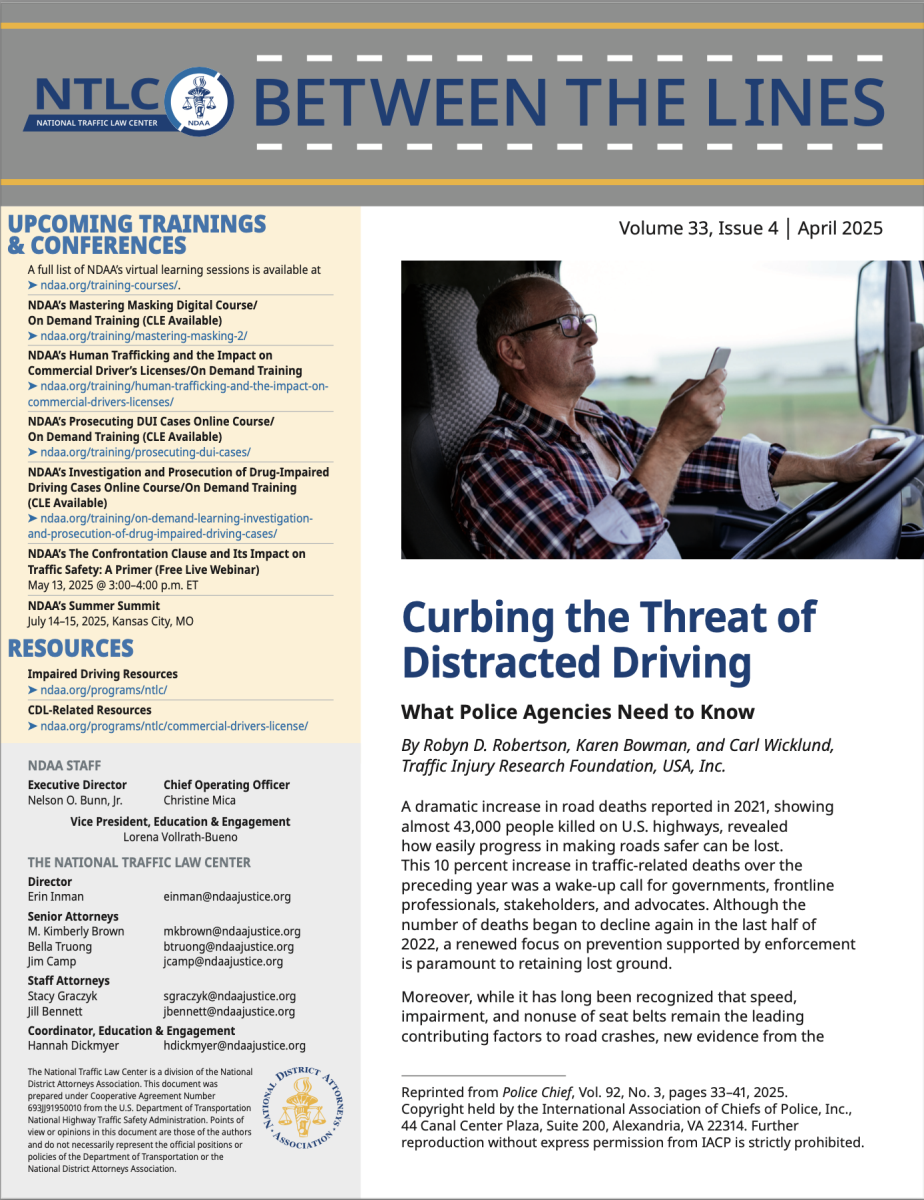 This article highlights the growing threat of distracted driving, which is significantly underreported but contributes to a substantial portion of traffic fatalities. It emphasizes the importance of well-crafted laws, consistent enforcement, and emerging technologies—such as smart cameras and automated systems—to detect and deter distracted driving. The report also advocates for workplace policies, officer training, and leadership within police agencies to prioritize distracted driving enforcement and improve road safety outcomes.
This article highlights the growing threat of distracted driving, which is significantly underreported but contributes to a substantial portion of traffic fatalities. It emphasizes the importance of well-crafted laws, consistent enforcement, and emerging technologies—such as smart cameras and automated systems—to detect and deter distracted driving. The report also advocates for workplace policies, officer training, and leadership within police agencies to prioritize distracted driving enforcement and improve road safety outcomes.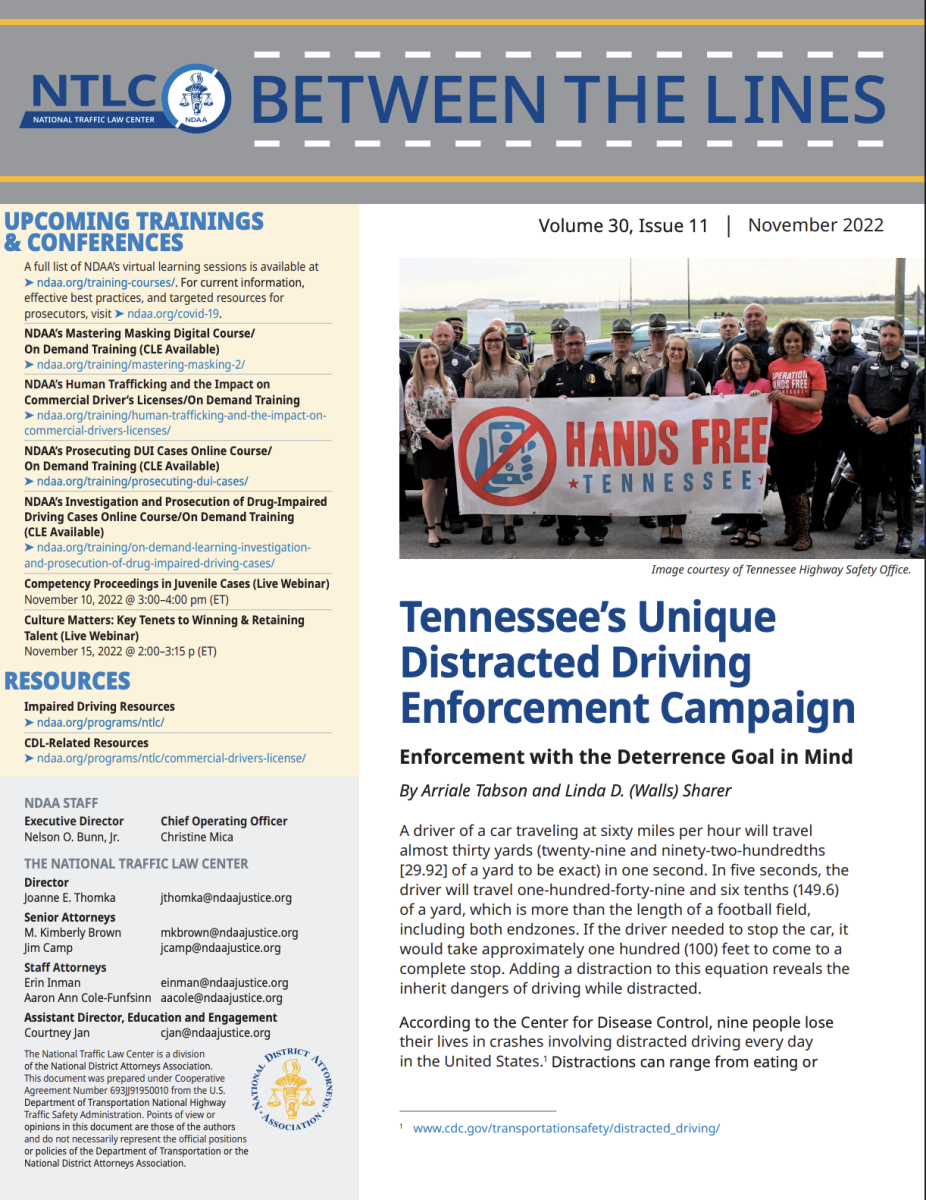 The November 2022 report details Tennessee’s innovative distracted driving enforcement campaign, which used marked buses to observe violations and coordinate with patrol officers to issue citations. Branded as Operation Incognito and later Operation Hands Free, these statewide bus tours resulted in thousands of citations and increased public awareness, contributing to a decline in distracted driving-related crashes. The campaign evolved to emphasize education and deterrence, and its success has inspired similar efforts in other states.
The November 2022 report details Tennessee’s innovative distracted driving enforcement campaign, which used marked buses to observe violations and coordinate with patrol officers to issue citations. Branded as Operation Incognito and later Operation Hands Free, these statewide bus tours resulted in thousands of citations and increased public awareness, contributing to a decline in distracted driving-related crashes. The campaign evolved to emphasize education and deterrence, and its success has inspired similar efforts in other states.- Impairment by alcohol, drugs (licit, illicit, prescription, and OTC), and poly-drug use
- Chemical Testing, including breath, blood, urine, and oral fluid
- Impaired Driving Defenses
- Drug Recognition Experts
- Implied Consent and Refusals
- Validation Studies
- Treatment Courts
- Mental Health & Substance Use Disorders
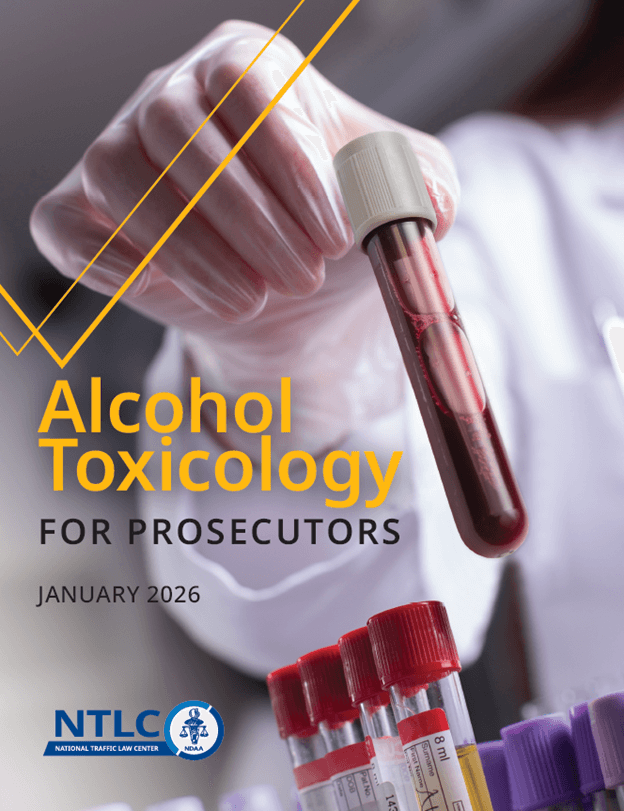 Alcohol Toxicology for Prosecutors, newly updated and refreshed in 2026, it explains scientific methods like retrograde extrapolation to estimate BAC at the time of driving, how to anticipate and counter common defenses such as post-incident drinking or rising BAC claims, and how to interpret various types of test results. The guide emphasizes using expert testimony and scientific principles to strengthen DUI cases, especially against repeat offenders.
Alcohol Toxicology for Prosecutors, newly updated and refreshed in 2026, it explains scientific methods like retrograde extrapolation to estimate BAC at the time of driving, how to anticipate and counter common defenses such as post-incident drinking or rising BAC claims, and how to interpret various types of test results. The guide emphasizes using expert testimony and scientific principles to strengthen DUI cases, especially against repeat offenders. 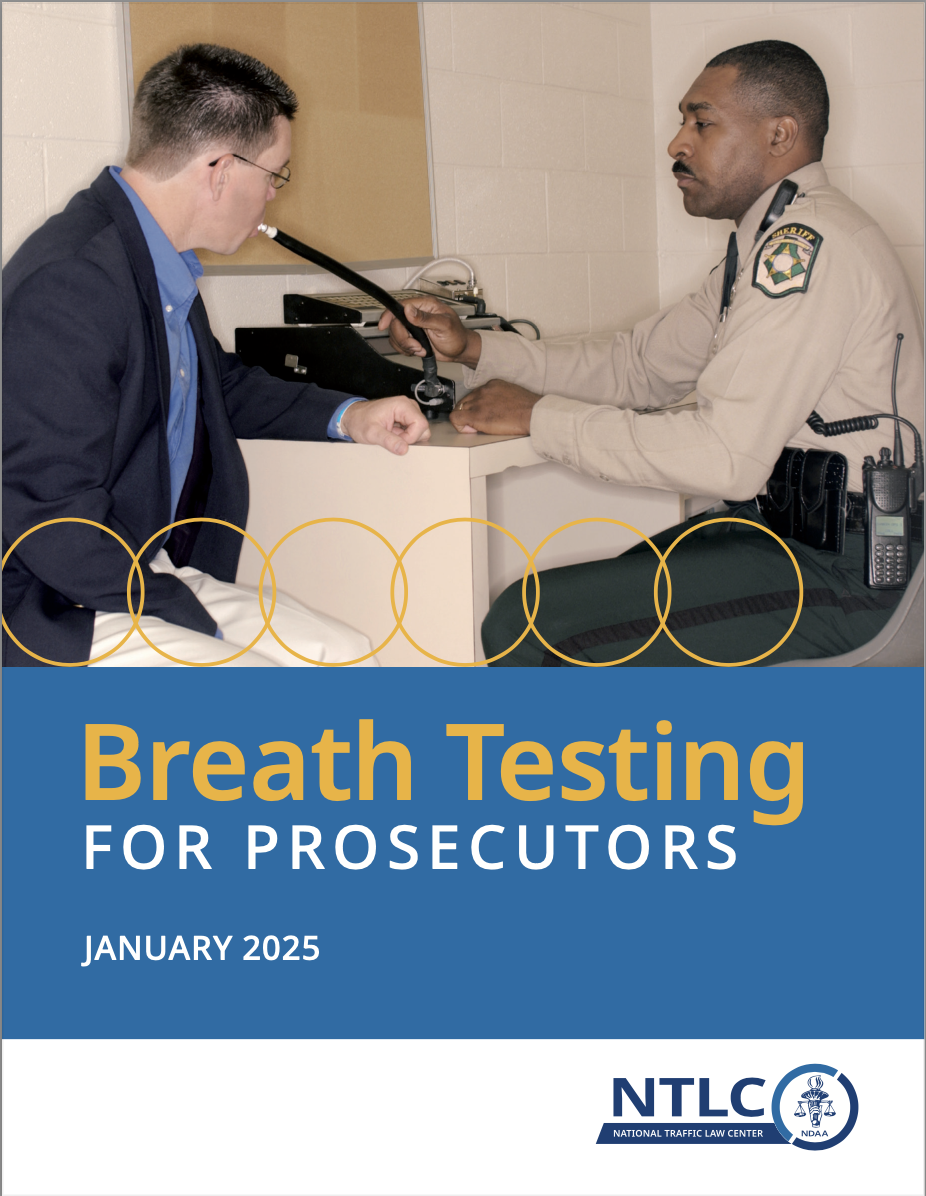 The 2025 edition of Breath Testing for Prosecutors provides a comprehensive guide to evidential breath testing (EBT) in DUI cases, covering the science behind breath alcohol analysis, instrument types, calibration protocols, and quality assurance standards. It also addresses common legal and scientific challenges to breath test results, such as residual mouth alcohol, medical conditions, and environmental interference, offering strategies for prosecutors to effectively counter these defenses. The monograph emphasizes the reliability of modern breath testing when properly maintained and operated, and serves as a vital resource for legal professionals handling impaired driving cases.
The 2025 edition of Breath Testing for Prosecutors provides a comprehensive guide to evidential breath testing (EBT) in DUI cases, covering the science behind breath alcohol analysis, instrument types, calibration protocols, and quality assurance standards. It also addresses common legal and scientific challenges to breath test results, such as residual mouth alcohol, medical conditions, and environmental interference, offering strategies for prosecutors to effectively counter these defenses. The monograph emphasizes the reliability of modern breath testing when properly maintained and operated, and serves as a vital resource for legal professionals handling impaired driving cases.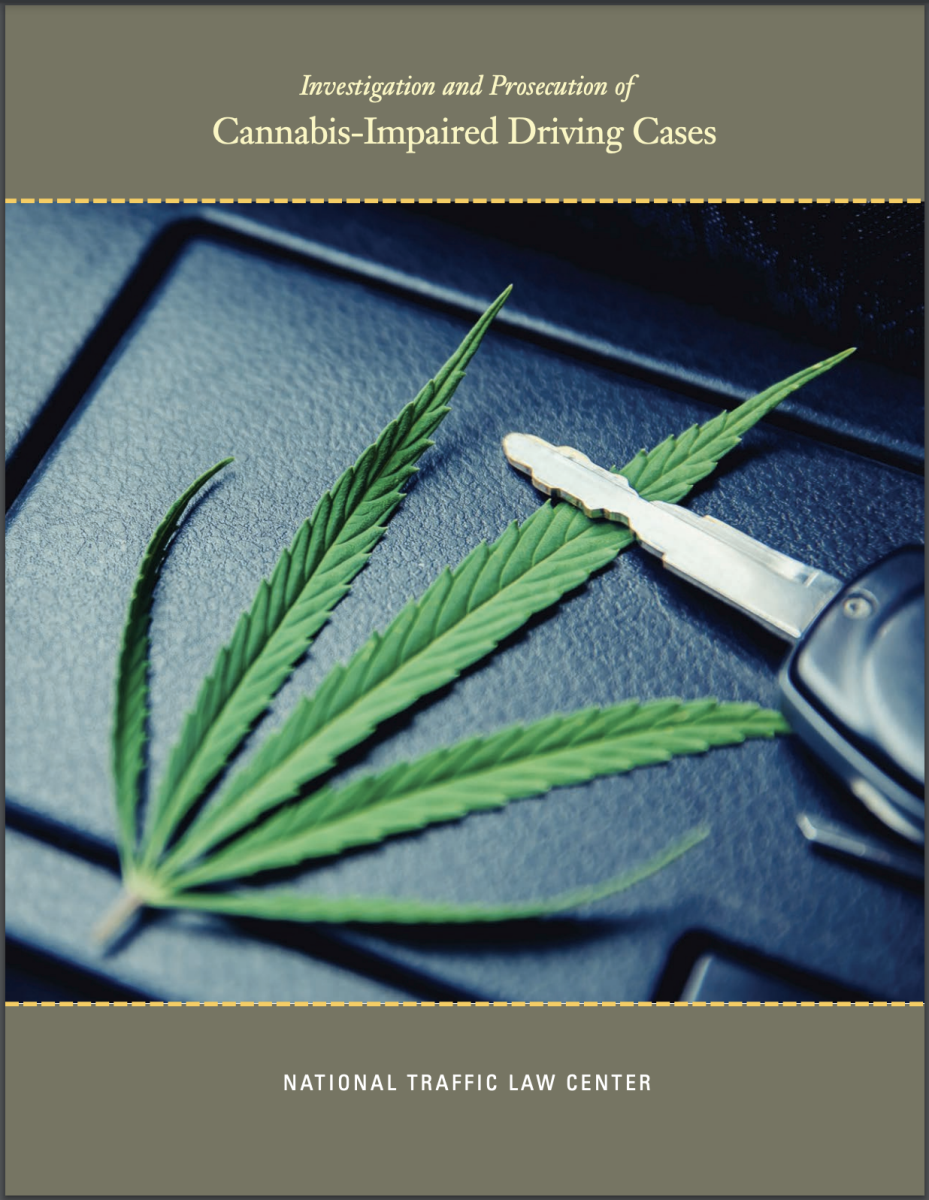 The guide Investigation and Prosecution of Cannabis-Impaired Driving Cases offers a comprehensive framework for law enforcement and prosecutors to address the growing challenge of cannabis-impaired driving. It details the physiological effects of cannabis, investigative tools like SFSTs and DRE evaluations, and legal considerations including search warrants and evidentiary standards. Emphasizing training, documentation, and expert collaboration, the guide also provides strategies for courtroom preparation, handling defenses, and educating jurors on cannabis impairment.
The guide Investigation and Prosecution of Cannabis-Impaired Driving Cases offers a comprehensive framework for law enforcement and prosecutors to address the growing challenge of cannabis-impaired driving. It details the physiological effects of cannabis, investigative tools like SFSTs and DRE evaluations, and legal considerations including search warrants and evidentiary standards. Emphasizing training, documentation, and expert collaboration, the guide also provides strategies for courtroom preparation, handling defenses, and educating jurors on cannabis impairment.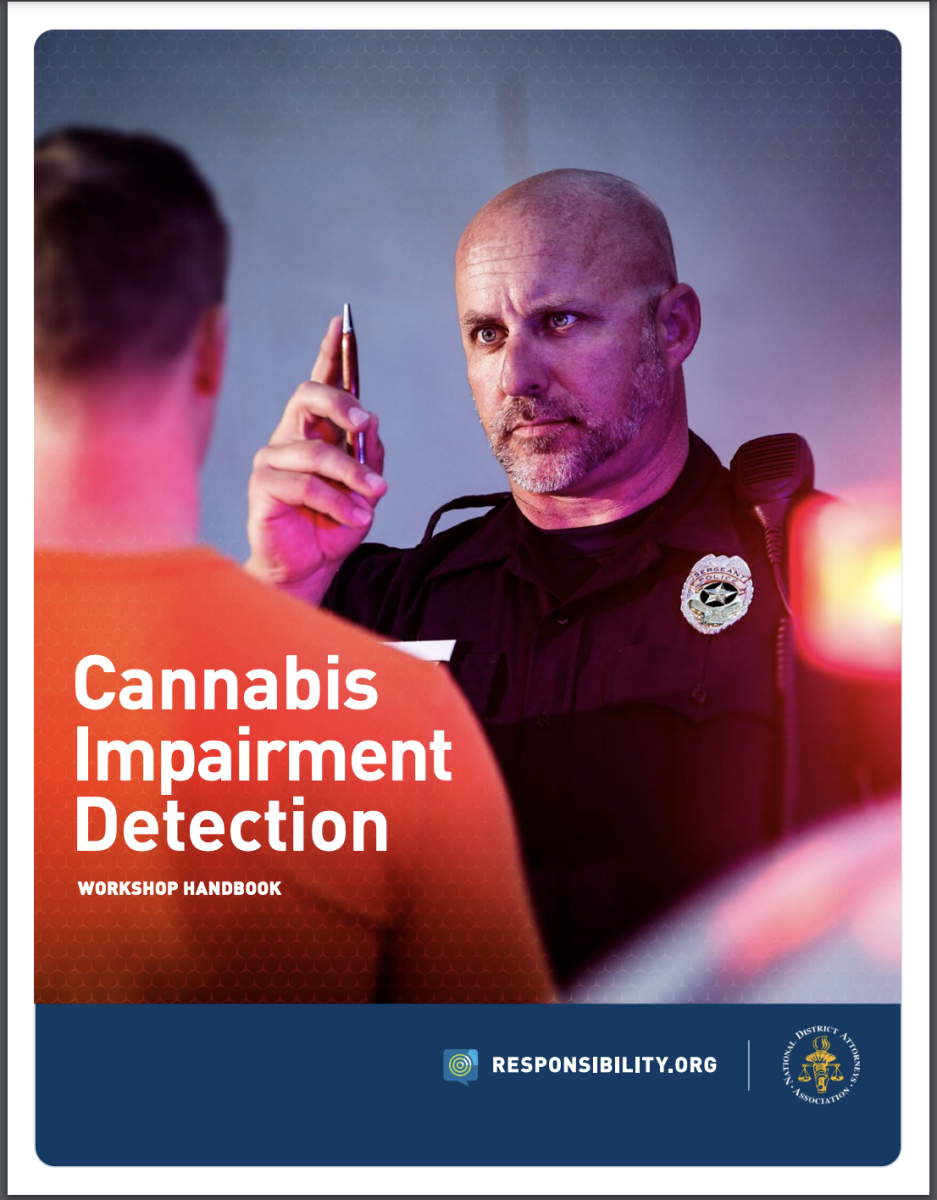 The Cannabis Impairment Detection Workshop Handbook provides a comprehensive guide for law enforcement and prosecutors to plan and conduct training workshops that simulate cannabis impairment using volunteer consumers. It outlines legal, logistical, and safety considerations for hosting these workshops, including cannabis procurement, stakeholder engagement, consumer recruitment, and instructional content. The handbook emphasizes the importance of hands-on training to improve detection of cannabis-impaired driving and foster collaboration between law enforcement and the cannabis community.
The Cannabis Impairment Detection Workshop Handbook provides a comprehensive guide for law enforcement and prosecutors to plan and conduct training workshops that simulate cannabis impairment using volunteer consumers. It outlines legal, logistical, and safety considerations for hosting these workshops, including cannabis procurement, stakeholder engagement, consumer recruitment, and instructional content. The handbook emphasizes the importance of hands-on training to improve detection of cannabis-impaired driving and foster collaboration between law enforcement and the cannabis community.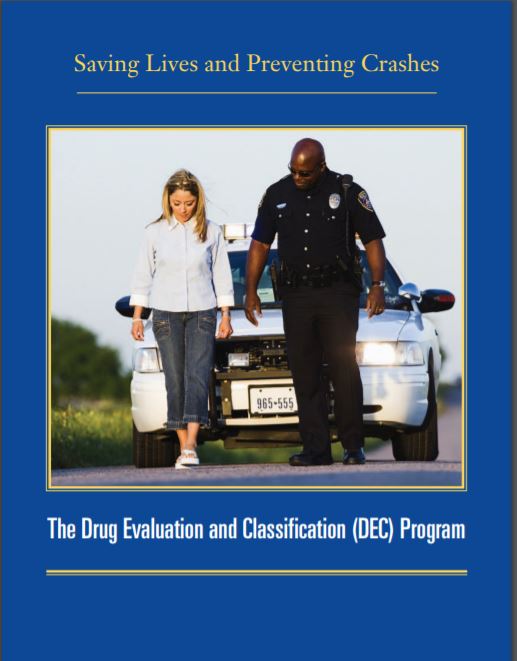 The Drug Evaluation and Classification (DEC) Program provides an overview of this nationally recognized initiative and provides prosecutors with a basic understanding of the training law enforcement officers undergo to identify drug-impaired drivers and the standardized 12-step evaluation process the officers use. The guide highlights the extensive scientific research and legal precedent supporting the program and how it enhances impaired driving enforcement and prosecution, contributing significantly to traffic safety and public health.
The Drug Evaluation and Classification (DEC) Program provides an overview of this nationally recognized initiative and provides prosecutors with a basic understanding of the training law enforcement officers undergo to identify drug-impaired drivers and the standardized 12-step evaluation process the officers use. The guide highlights the extensive scientific research and legal precedent supporting the program and how it enhances impaired driving enforcement and prosecution, contributing significantly to traffic safety and public health.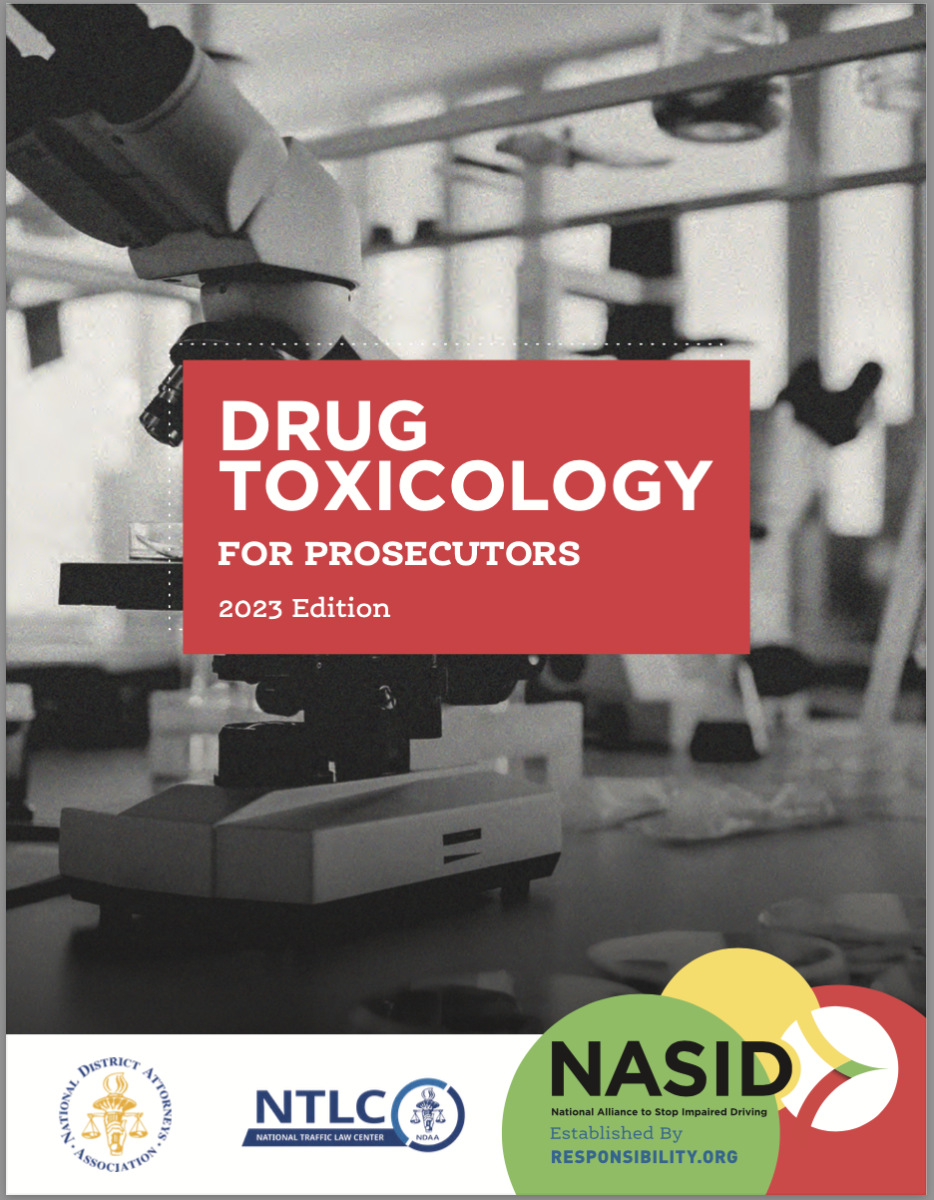 The 2023 edition of Drug Toxicology for Prosecutors provides updated guidance on handling drug-impaired driving cases, emphasizing the complexities of interpreting toxicology results and the importance of understanding pharmacology, specimen types, and laboratory practices. It highlights the challenges posed by novel psychoactive substances, polysubstance use, and individual variability in drug effects, and stresses the need for collaboration between prosecutors and toxicologists to build strong cases. The monograph also outlines best practices for expert testimony and offers resources to help prosecutors effectively present scientific evidence in court.
The 2023 edition of Drug Toxicology for Prosecutors provides updated guidance on handling drug-impaired driving cases, emphasizing the complexities of interpreting toxicology results and the importance of understanding pharmacology, specimen types, and laboratory practices. It highlights the challenges posed by novel psychoactive substances, polysubstance use, and individual variability in drug effects, and stresses the need for collaboration between prosecutors and toxicologists to build strong cases. The monograph also outlines best practices for expert testimony and offers resources to help prosecutors effectively present scientific evidence in court.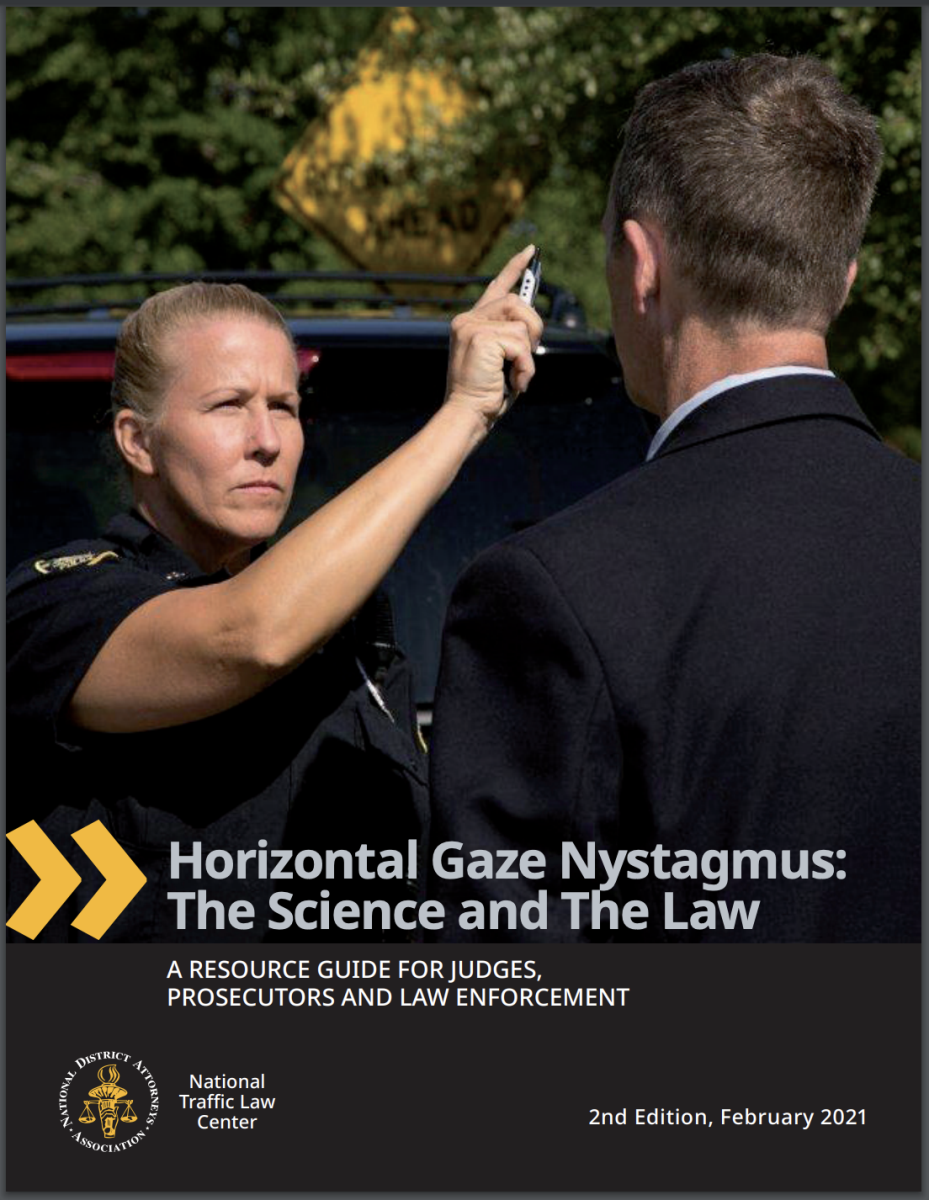 Designed especially to assist judges, prosecutors and law enforcement personnel, this guide explains the physiological basis and legal admissibility of the HGN test, a key component of standardized field sobriety testing used to detect alcohol impairment. It details how alcohol and certain drugs affect eye movements, outlines proper test administration, and provides scientific validation and courtroom strategies for prosecutors and law enforcement. The guide emphasizes HGN’s reliability and utility in impaired driving cases, offering extensive resources to support its use in legal proceedings.
Designed especially to assist judges, prosecutors and law enforcement personnel, this guide explains the physiological basis and legal admissibility of the HGN test, a key component of standardized field sobriety testing used to detect alcohol impairment. It details how alcohol and certain drugs affect eye movements, outlines proper test administration, and provides scientific validation and courtroom strategies for prosecutors and law enforcement. The guide emphasizes HGN’s reliability and utility in impaired driving cases, offering extensive resources to support its use in legal proceedings.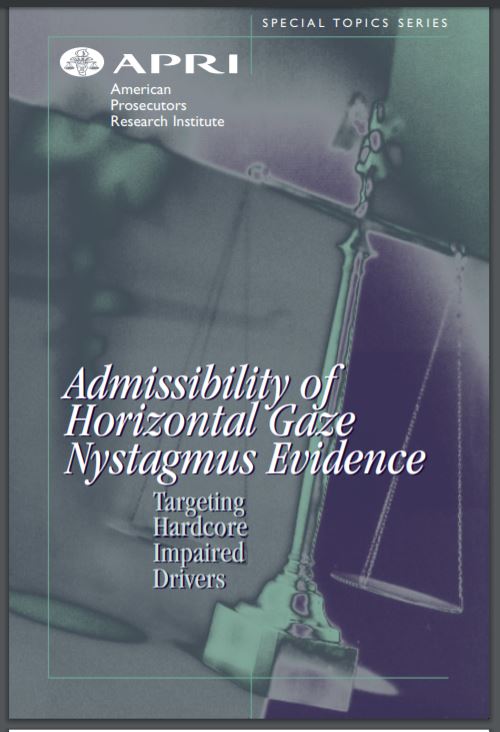 This guide explores the admissibility of the Horizontal Gaze Nystagmus (HGN) test in DUI prosecutions, emphasizing its scientific validity and reliability as a field sobriety test. It outlines the foundational legal hurdles prosecutors face under standards like Frye and Daubert, and provides strategies for establishing admissibility, including expert testimony and pretrial motions. The publication also highlights the role of optometrists and research supporting HGN's effectiveness, especially in detecting impairment among repeat offenders who may mask other signs of intoxication.
This guide explores the admissibility of the Horizontal Gaze Nystagmus (HGN) test in DUI prosecutions, emphasizing its scientific validity and reliability as a field sobriety test. It outlines the foundational legal hurdles prosecutors face under standards like Frye and Daubert, and provides strategies for establishing admissibility, including expert testimony and pretrial motions. The publication also highlights the role of optometrists and research supporting HGN's effectiveness, especially in detecting impairment among repeat offenders who may mask other signs of intoxication.Topics Related to Litigation
- Trial Advocacy Issues--Opening statements, direct and cross examination, closing arguments, jury selection, predicate questions, and sentencing.
- Constitutional Issues--Probable cause, arrest, search and seizure, right to counsel, and double jeopardy.
- Frye & Daubert Issues--breath testing instruments, HGN, toxicology.
- Evidentiary Issues--Discovery, prosecutorial discretion, testimony, prior convictions.
- Supervision Issues (pre-trial and post-conviction)--Criminal records, ignition interlock, recidivism/ rehabilitation programs, sanctions, mandatory minimums, suspended/ revoked licenses, vehicle forfeiture.
Admissibility of Horizontal Gaze Nystagmus Evidence
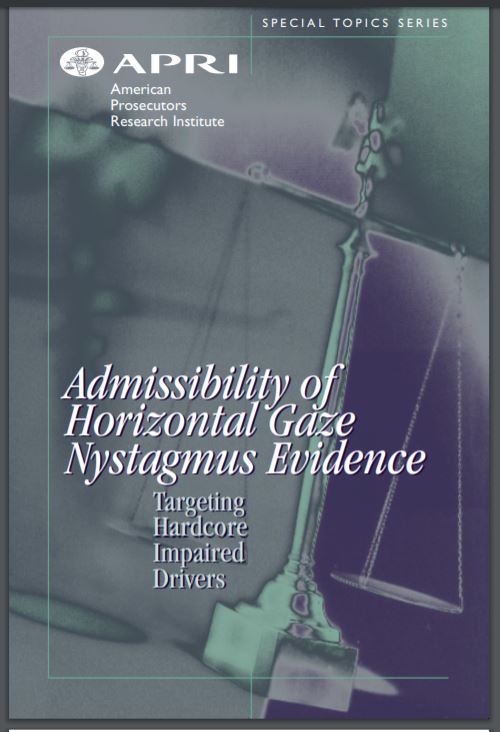 This guide explores the admissibility of the Horizontal Gaze Nystagmus (HGN) test in DUI prosecutions, emphasizing its scientific validity and reliability as a field sobriety test. It outlines the foundational legal hurdles prosecutors face under standards like Frye and Daubert, and provides strategies for establishing admissibility, including expert testimony and pretrial motions. The publication also highlights the role of optometrists and research supporting HGN's effectiveness, especially in detecting impairment among repeat offenders who may mask other signs of intoxication.
This guide explores the admissibility of the Horizontal Gaze Nystagmus (HGN) test in DUI prosecutions, emphasizing its scientific validity and reliability as a field sobriety test. It outlines the foundational legal hurdles prosecutors face under standards like Frye and Daubert, and provides strategies for establishing admissibility, including expert testimony and pretrial motions. The publication also highlights the role of optometrists and research supporting HGN's effectiveness, especially in detecting impairment among repeat offenders who may mask other signs of intoxication.Basic Trial Techniques for Prosecutors in Impaired Driving Cases
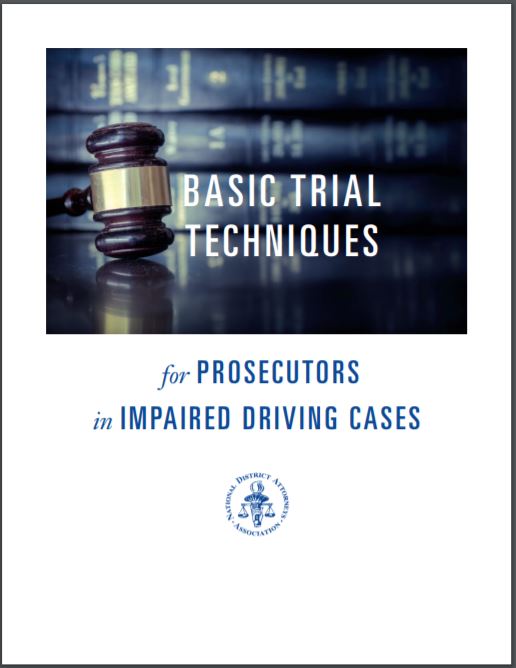 Basic Trial Techniques for Prosecutors is a comprehensive guide for prosecutors handling impaired driving cases, offering practical strategies for every stage of trial—from pre-trial preparation and jury selection to opening statements, witness examination, and closing arguments. It emphasizes the importance of developing a compelling case theme, anticipating defenses, and presenting evidence clearly and persuasively. The guide also provides detailed techniques for cross-examination and rebuttal, aiming to help prosecutors advocate effectively while maintaining professionalism and integrity in pursuit of justice.
Basic Trial Techniques for Prosecutors is a comprehensive guide for prosecutors handling impaired driving cases, offering practical strategies for every stage of trial—from pre-trial preparation and jury selection to opening statements, witness examination, and closing arguments. It emphasizes the importance of developing a compelling case theme, anticipating defenses, and presenting evidence clearly and persuasively. The guide also provides detailed techniques for cross-examination and rebuttal, aiming to help prosecutors advocate effectively while maintaining professionalism and integrity in pursuit of justice.
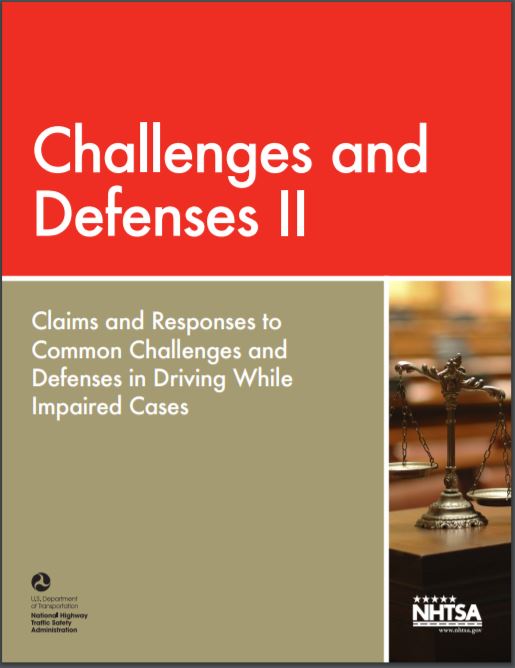 The Challenges and Defenses II guide provides prosecutors with detailed responses to common defense claims in impaired driving cases, particularly those involving prescription drugs, over-the-counter medications, and scientific challenges to breath and blood testing. It addresses defenses such as involuntary intoxication, medical conditions like diabetes and GERD, and technical claims about testing procedures, measurement uncertainty, and source code access. The guide emphasizes evidence-based rebuttals and strategic courtroom approaches to uphold the reliability of DUI investigations and prosecutions.
The Challenges and Defenses II guide provides prosecutors with detailed responses to common defense claims in impaired driving cases, particularly those involving prescription drugs, over-the-counter medications, and scientific challenges to breath and blood testing. It addresses defenses such as involuntary intoxication, medical conditions like diabetes and GERD, and technical claims about testing procedures, measurement uncertainty, and source code access. The guide emphasizes evidence-based rebuttals and strategic courtroom approaches to uphold the reliability of DUI investigations and prosecutions.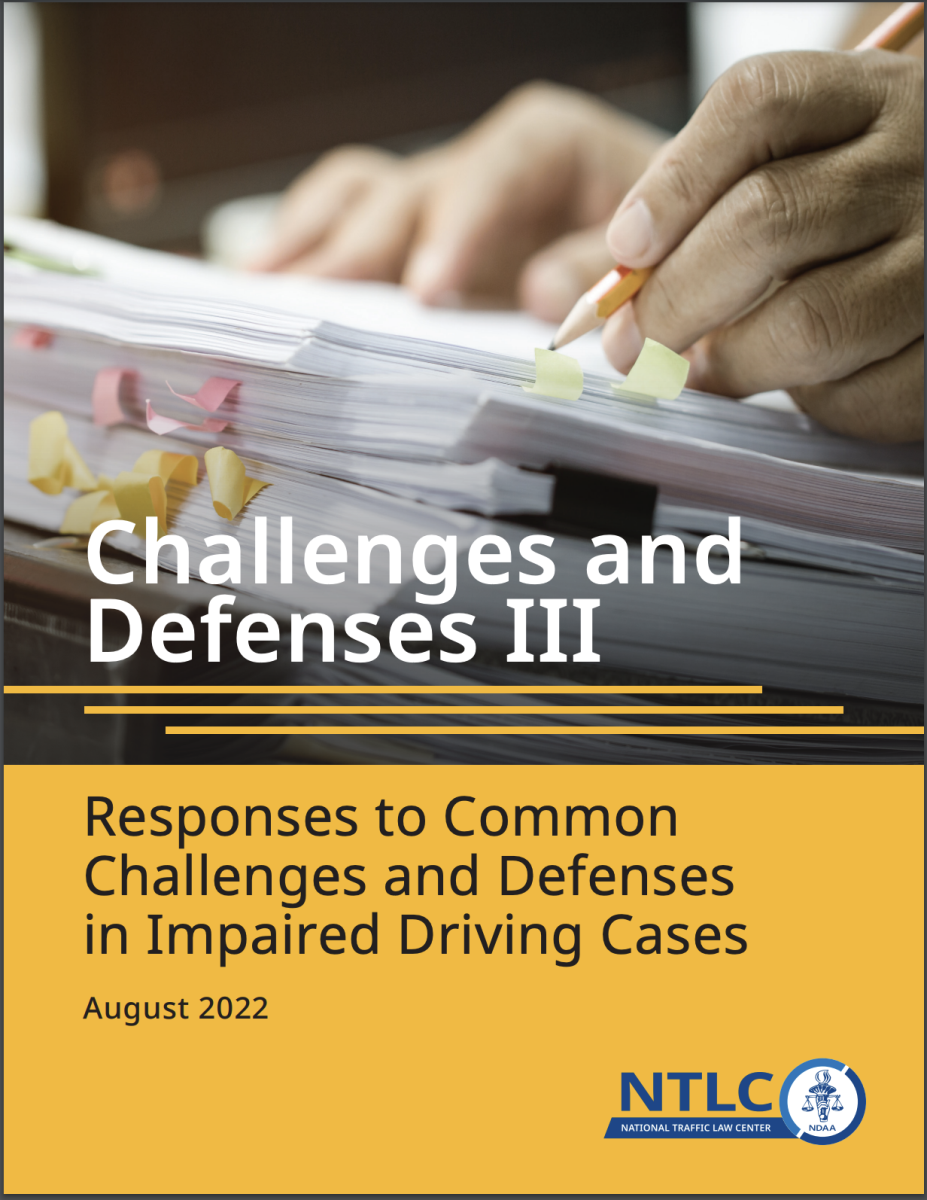 The Challenges and Defenses III monograph provides prosecutors with practical strategies to counter common defenses in drug-impaired driving cases, including challenges to toxicology testimony, incomplete drug recognition evaluations, recalled or expired evidence, and lack of driving proof. It also addresses behavioral defenses such as ADHD, autism spectrum disorder, and auto-brewery syndrome, and offers guidance on handling commercial driver’s license (CDL) cases and jury selection. The resource emphasizes preparation, scientific understanding, and effective courtroom techniques to help prosecutors navigate complex impaired driving prosecutions.
The Challenges and Defenses III monograph provides prosecutors with practical strategies to counter common defenses in drug-impaired driving cases, including challenges to toxicology testimony, incomplete drug recognition evaluations, recalled or expired evidence, and lack of driving proof. It also addresses behavioral defenses such as ADHD, autism spectrum disorder, and auto-brewery syndrome, and offers guidance on handling commercial driver’s license (CDL) cases and jury selection. The resource emphasizes preparation, scientific understanding, and effective courtroom techniques to help prosecutors navigate complex impaired driving prosecutions.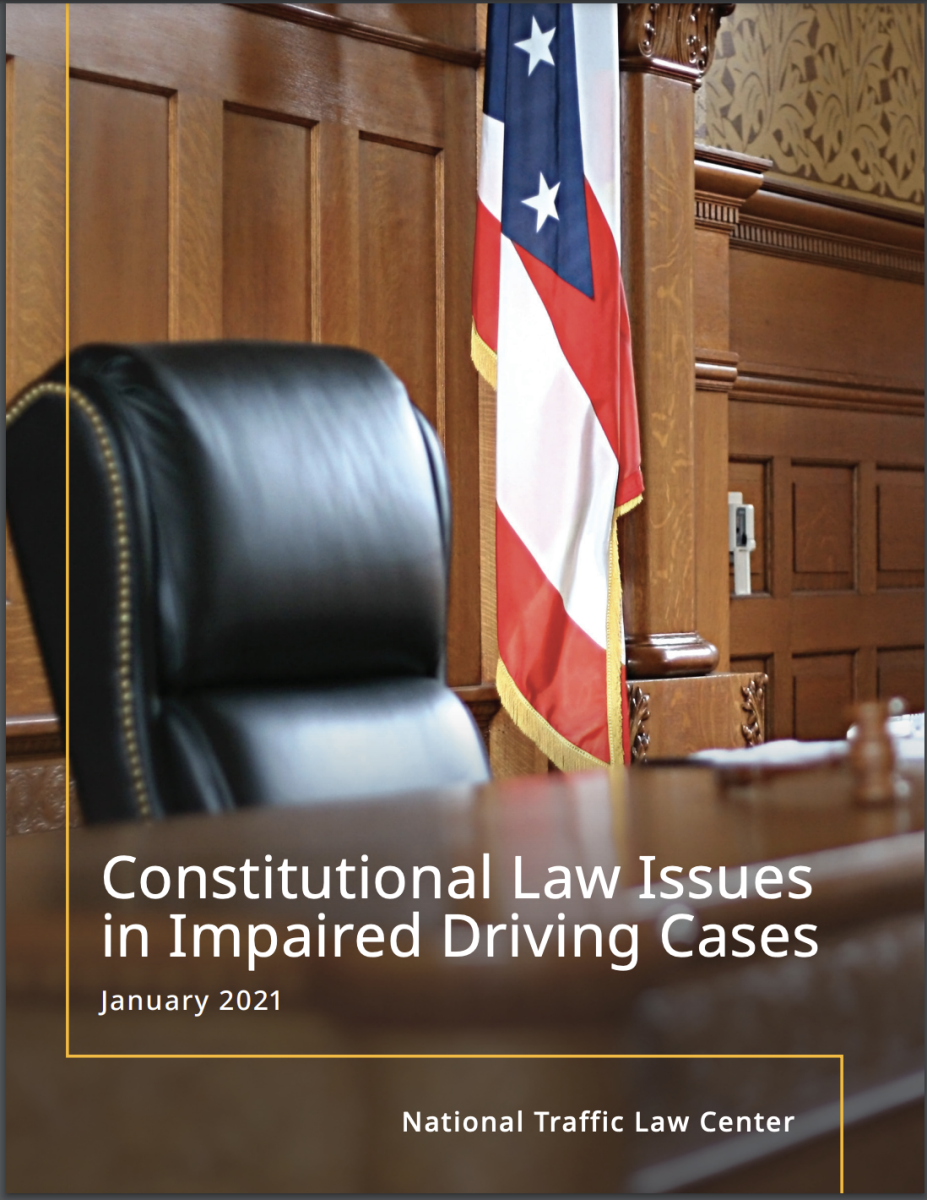 The Constitutional Law Issues in Impaired Driving Cases monograph provides a comprehensive analysis of how the Fourth, Fifth, Sixth, and Fourteenth Amendments apply to impaired driving investigations and prosecutions. It outlines key U.S. Supreme Court decisions affecting searches, seizures, interrogations, right to counsel, confrontation of witnesses, and due process in DUI cases. Designed as a legal reference for prosecutors and law enforcement, it emphasizes the importance of understanding constitutional protections and procedural requirements to ensure fair trials and effective enforcement.
The Constitutional Law Issues in Impaired Driving Cases monograph provides a comprehensive analysis of how the Fourth, Fifth, Sixth, and Fourteenth Amendments apply to impaired driving investigations and prosecutions. It outlines key U.S. Supreme Court decisions affecting searches, seizures, interrogations, right to counsel, confrontation of witnesses, and due process in DUI cases. Designed as a legal reference for prosecutors and law enforcement, it emphasizes the importance of understanding constitutional protections and procedural requirements to ensure fair trials and effective enforcement.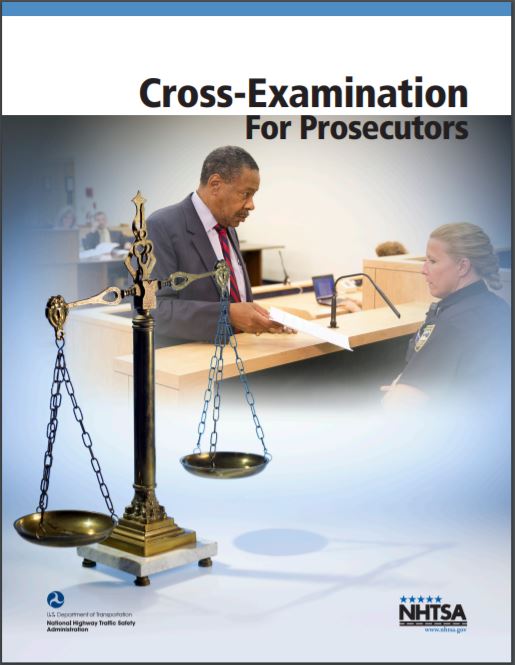 The Cross-Examination for Prosecutors guide offers comprehensive strategies for effectively questioning defense witnesses, especially in impaired driving cases. It emphasizes preparation, understanding defense tactics, and using cross-examination to reinforce the prosecution’s case, gain concessions, and impeach witness credibility. Special attention is given to handling expert witnesses, including researching their background, challenging their qualifications, and exposing weaknesses in their testimony through structured, purposeful questioning.
The Cross-Examination for Prosecutors guide offers comprehensive strategies for effectively questioning defense witnesses, especially in impaired driving cases. It emphasizes preparation, understanding defense tactics, and using cross-examination to reinforce the prosecution’s case, gain concessions, and impeach witness credibility. Special attention is given to handling expert witnesses, including researching their background, challenging their qualifications, and exposing weaknesses in their testimony through structured, purposeful questioning. The Expert Witness Guide provides law enforcement officers and scientific experts with a comprehensive overview of their roles in impaired driving cases, including courtroom procedures, testimony preparation, and legal principles. It explains how expert witnesses—such as toxicologists, crash reconstructionists, and drug recognition evaluators—can effectively present complex scientific evidence in understandable terms to judges and juries. The guide also offers practical advice on courtroom conduct, cross-examination, and avoiding common pitfalls to ensure credible and impactful testimony.
The Expert Witness Guide provides law enforcement officers and scientific experts with a comprehensive overview of their roles in impaired driving cases, including courtroom procedures, testimony preparation, and legal principles. It explains how expert witnesses—such as toxicologists, crash reconstructionists, and drug recognition evaluators—can effectively present complex scientific evidence in understandable terms to judges and juries. The guide also offers practical advice on courtroom conduct, cross-examination, and avoiding common pitfalls to ensure credible and impactful testimony.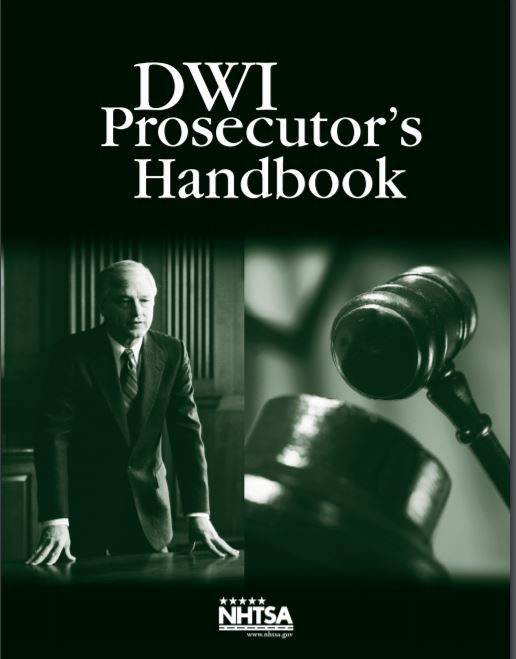 The DWI Prosecutors Handbook is a comprehensive guide designed to assist prosecutors in effectively handling driving while intoxicated (DWI) cases. It covers every stage of prosecution—from case review and evidence collection to trial preparation and witness management—emphasizing the importance of understanding legal procedures, forensic evidence, and common defense strategies. The handbook also provides practical tools, such as checklists, timelines, and expert guidance, to help prosecutors build strong cases and support victims throughout the legal process.
The DWI Prosecutors Handbook is a comprehensive guide designed to assist prosecutors in effectively handling driving while intoxicated (DWI) cases. It covers every stage of prosecution—from case review and evidence collection to trial preparation and witness management—emphasizing the importance of understanding legal procedures, forensic evidence, and common defense strategies. The handbook also provides practical tools, such as checklists, timelines, and expert guidance, to help prosecutors build strong cases and support victims throughout the legal process.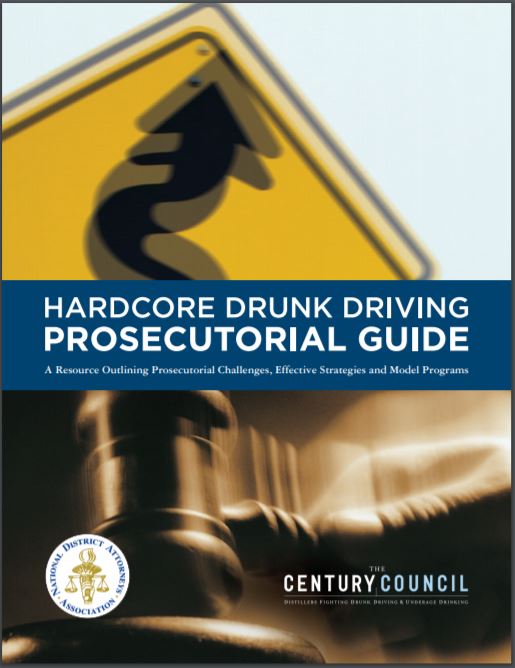 The Hardcore Drunk Driving Prosecutorial Guide provides prosecutors with strategies to identify, prosecute, and reduce recidivism among high-risk offenders—those with high blood alcohol levels, repeat offenses, and resistance to change. It emphasizes a multidisciplinary approach involving courts, law enforcement, probation, treatment providers, and public engagement, and outlines effective sanctions such as ignition interlocks, staggered sentencing, and intensive supervision. The guide advocates for individualized case management and comprehensive sentencing to promote behavioral change and enhance public safety.
The Hardcore Drunk Driving Prosecutorial Guide provides prosecutors with strategies to identify, prosecute, and reduce recidivism among high-risk offenders—those with high blood alcohol levels, repeat offenses, and resistance to change. It emphasizes a multidisciplinary approach involving courts, law enforcement, probation, treatment providers, and public engagement, and outlines effective sanctions such as ignition interlocks, staggered sentencing, and intensive supervision. The guide advocates for individualized case management and comprehensive sentencing to promote behavioral change and enhance public safety.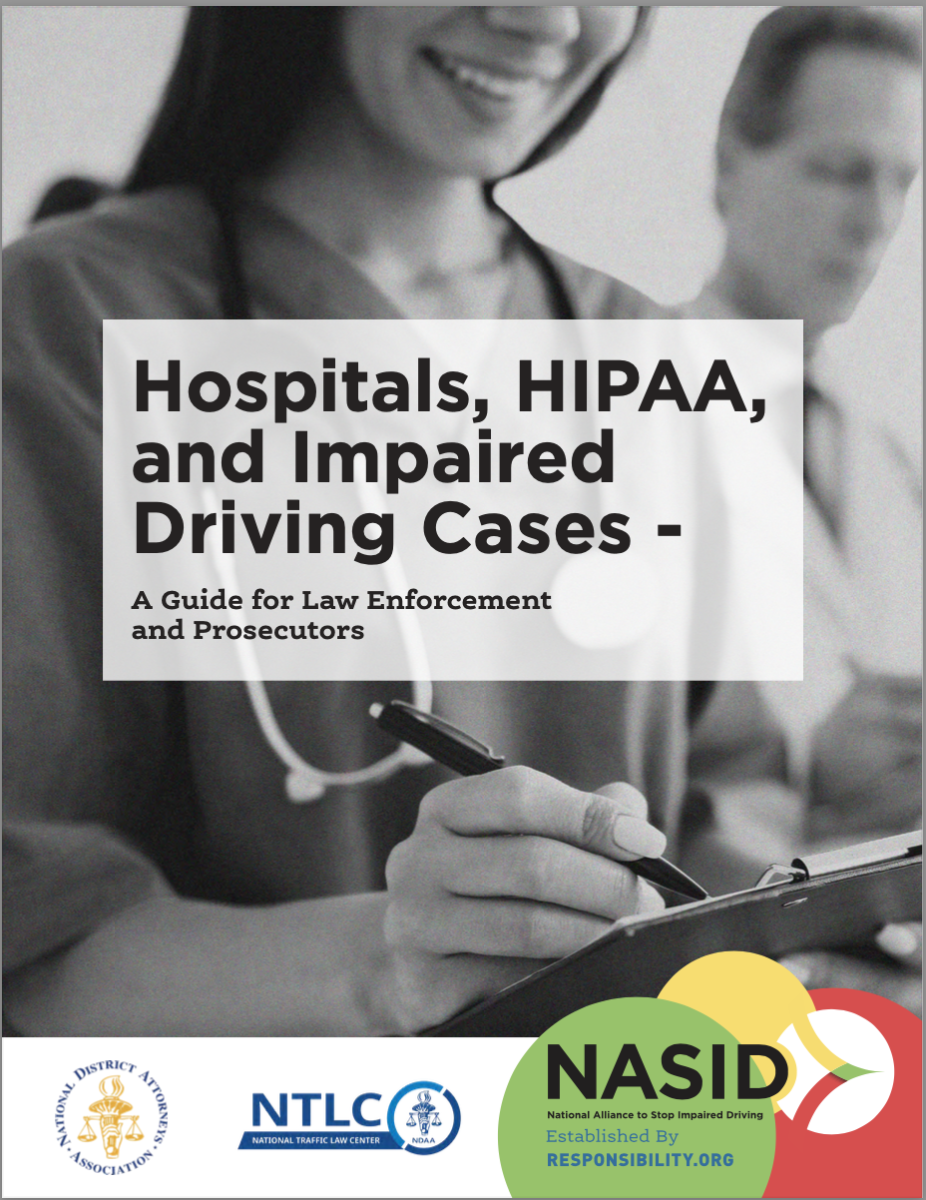 The guide Hospitals, HIPAA, and Impaired Driving Cases helps law enforcement and prosecutors navigate the legal and procedural challenges of obtaining medical evidence from hospitals in impaired driving investigations. It clarifies how HIPAA applies to criminal cases, outlines permissible disclosures of protected health information, and emphasizes the importance of building cooperative relationships with hospital personnel. The guide also offers strategies to streamline evidence collection, including law enforcement phlebotomy programs and memorandums of understanding, to improve prosecution outcomes while minimizing courtroom appearances by medical staff.
The guide Hospitals, HIPAA, and Impaired Driving Cases helps law enforcement and prosecutors navigate the legal and procedural challenges of obtaining medical evidence from hospitals in impaired driving investigations. It clarifies how HIPAA applies to criminal cases, outlines permissible disclosures of protected health information, and emphasizes the importance of building cooperative relationships with hospital personnel. The guide also offers strategies to streamline evidence collection, including law enforcement phlebotomy programs and memorandums of understanding, to improve prosecution outcomes while minimizing courtroom appearances by medical staff.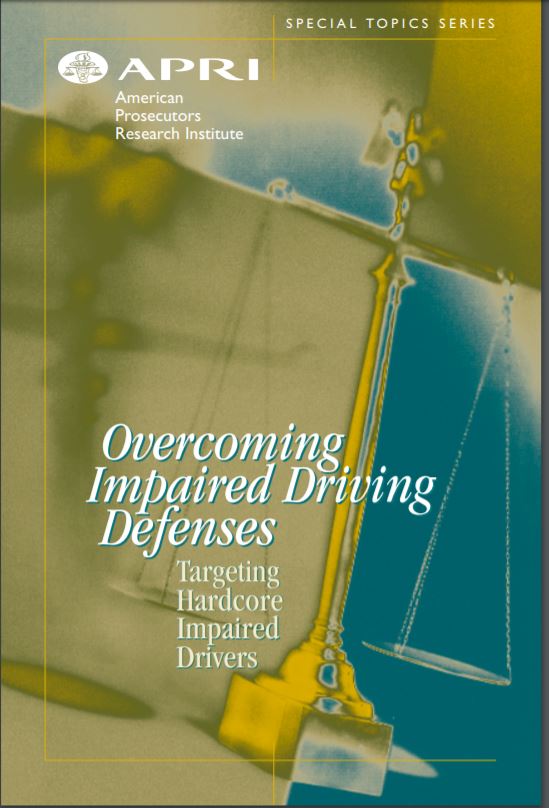 The Overcoming Impaired Driving Defenses guide provides prosecutors with strategies to counter common defense tactics in DUI cases, including challenges to traffic stops, arrests, field sobriety tests, breathalyzer accuracy, and Miranda rights. It emphasizes the importance of preparation, understanding behavioral indicators of impairment, and effectively presenting evidence to juries. The guide also offers practical tips for courtroom responses and highlights additional resources for prosecuting impaired driving cases.
The Overcoming Impaired Driving Defenses guide provides prosecutors with strategies to counter common defense tactics in DUI cases, including challenges to traffic stops, arrests, field sobriety tests, breathalyzer accuracy, and Miranda rights. It emphasizes the importance of preparation, understanding behavioral indicators of impairment, and effectively presenting evidence to juries. The guide also offers practical tips for courtroom responses and highlights additional resources for prosecuting impaired driving cases.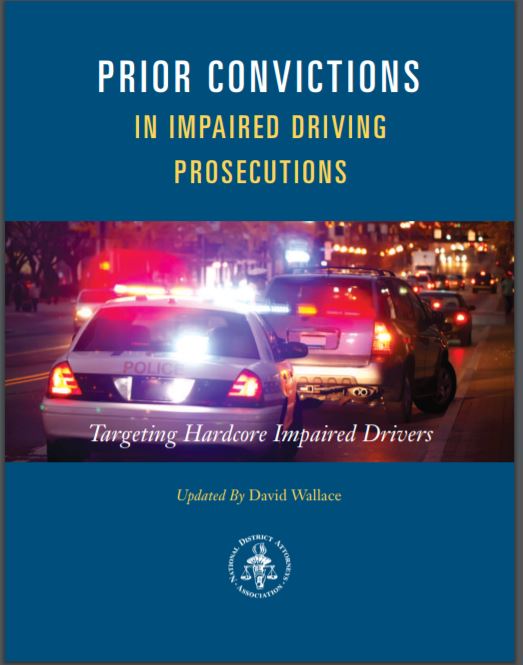 The Prior Convictions guide provides prosecutors with strategies to identify, verify, and use prior impaired driving convictions to enhance current DUI charges. It covers sources for locating past convictions, state-specific look-back periods, procedures for admitting prior records in court, and methods for proving the defendant's identity. The guide also addresses common defense tactics, including constitutional challenges, and offers practical tips for navigating both direct and collateral attacks on prior convictions.
The Prior Convictions guide provides prosecutors with strategies to identify, verify, and use prior impaired driving convictions to enhance current DUI charges. It covers sources for locating past convictions, state-specific look-back periods, procedures for admitting prior records in court, and methods for proving the defendant's identity. The guide also addresses common defense tactics, including constitutional challenges, and offers practical tips for navigating both direct and collateral attacks on prior convictions.
